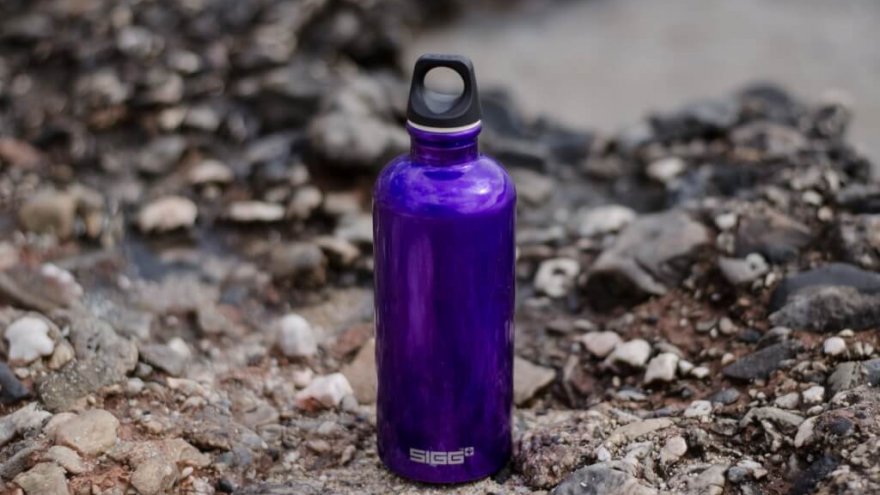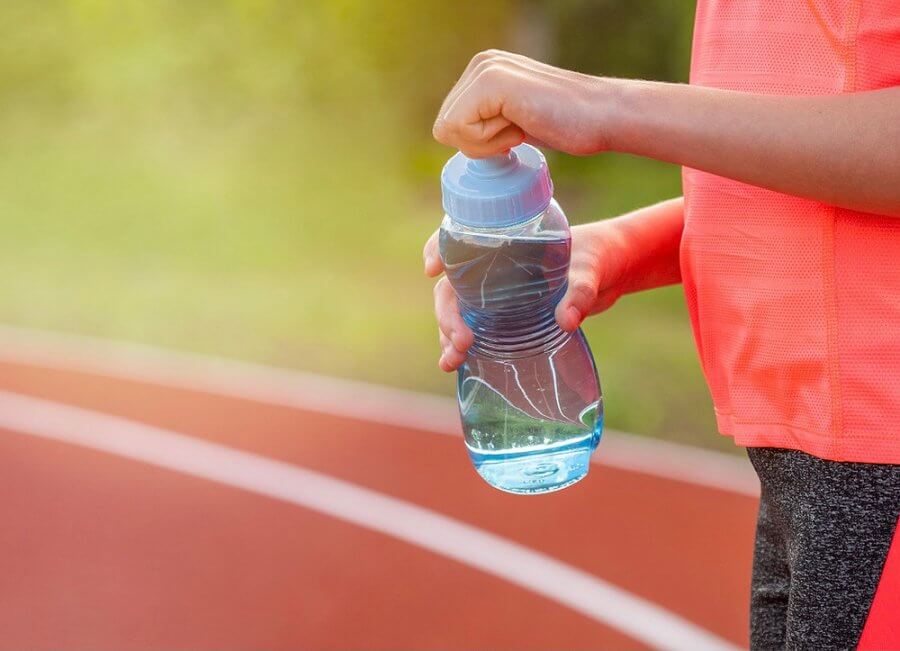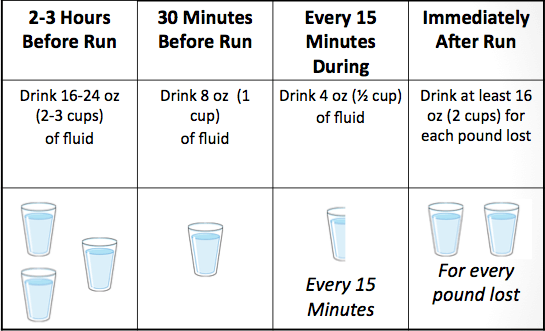Running Hydration: How Much Water Should a Runner Drink?

According to the Mayo Clinic, the amount of water you should drink in a day changes based upon your gender. A man should drink approximately 3.7 liters (or 15.5 cups) of water each day, while women need less at 2.7 liters (or 11.5 cups).
Some people are surprised to hear that this recommended amount comes from both beverages and food. Some food items have a lot of water in them. For example, watermelon is 92% water, so eating this delicious fruit helps you to hydrate!
How Much Water Should a Runner Drink a Day?
In everyday situations, a runner does not need more liquid in a day than other people. The advice given by Mayo Clinic seems to be about the norm. However, there are certain times when an athlete should increase their hydration.
As you are preparing for a goal race, for example, you may find yourself trying to hydrate more than expected. This is a good practice that helps you to get your body ready. Especially true if you are planning to do a distance/endurance event, there are some basic guidelines to follow.
In the few days leading up to your race, you should be aiming to drink 16 ounces of water every 3-4 hours. This practice will help you to toe the line in the best possible condition concerning your hydration!
When Should You Increase Your Water Intake?
Excellent question! Sometimes the recommended daily intake of water, ingested in a combination of fluids and food, may not be enough. If it is especially hot out, you probably need to increase your actual water intake. Humid weather can also cause you to sweat quite a bit, which is another scenario where you will want to drink more.
Engaging in exercise also may require you to drink more water. If you combine physical activity with heat and/or humidity, you for sure need more liquid!
Women who are pregnant or breastfeeding often require more water, as do people with specific health issues.
When push comes to shove, if you listen to your body and drink when you are thirsty, you will be getting enough liquid into your body. However, if you wait until you are thirsty to drink while running, it may be too late. More on that later.
How Long Before a Run Should You Hydrate?
Although it is best to hydrate somewhere from 60-90 minutes before you run, you can shorten that if necessary. To give your body a little time, try to drink some water at least 30 minutes before you run.
When Should You Hydrate When Running?

Again, this is a little different for everyone. On the one hand, you see that you need 6-8 ounces every 20 minutes. However, most runners find that small water sips actually sit better in the stomach than large gulps.
Personally, I take some sips of water every time my smartwatch buzzes that I have run a mile. I have a friend who sets her device to beep every 5 minutes when she takes in some fluids.
I also drink extra water when I take in my fuel. Since Honey Stinger Waffles are my fuel of choice, they take a bit of water to wash down!
Do I Need to Take Water on a Run?
In general, athletes need about 6 ounces of water for every 20 minutes of exercise. Now having said that, if you are running for less than an hour, you probably do not need to carry water. Honestly, there is some wiggle room in this based on certain circumstances.
I find I can comfortably run anything under 70 minutes or so without any form of fuel or hydration if it is less than 60 degrees out. However, as the temperature rises, so does my need for water and energy.
During winter running, it is not uncommon for me to run up to 90 minutes without any water at all. When doing that same run in July, I would fill both bottles on my hydration belt and bring along some fuel.
How Much Water Should You Carry When Running?
This depends on a few factors:
- How far are you running?
- How much water can you carry?
- Will you have an opportunity to refill your hydration pack?
- What is the weather like?
I use a hydration belt that holds two 10 ounce bottles of water. Suppose I am running in heat or humidity and think I may need more water. In that case, I strategically plan my route either past a public water fountain, a friend’s house, or a gas station. That way, I can get more liquid if needed.
I also carry a few bucks in case I need to fill a bottle with some type of sports drink. Once, I even bought a popsicle with the cash on a sweltering day.
While I have a hydration backpack that carries a lot more water, I don’t find it comfortable or best for my needs, so I stick with the belt.
I do know runners who prefer a handheld water bottle. These hold anywhere from 12-20 ounces. Maybe this is the perfect device for you!
How Much Should I Drink on Long Runs?
Generally, runners need 6-8 ounces of liquid every 20 minutes. If you are running less than 90 minutes, you can probably make do with water. However, suppose you are running longer than that or running in the heat. In that case, you probably need some kind of sports drink to restore your electrolytes.
How Much Water is Too Much for a Runner?
When it comes to hydration, you can, in fact, have too much of a good thing. Since athletes are warned about the dangers of dehydration, it has happened that people take in too much water, which is actually quite dangerous.

Runners who drink too much water can experience something called exercise-associated Hyponatremia. What happens is your blood sodium amount falls too low, which overwhelms your kidneys.
Drinking a sports drink with electrolytes can help prevent this. Also, be aware of how much liquid you are actually taking in.
Find Balance!
Like most things in life, hydration is all about balance. Drink water, but don’t overdo it. Listen to your body. If you feel like you are overheating, you probably are. If you feel dehydrated, you’ve hydrated too late.
The key to running smart is staying in tune with the cues your body is sending you. Be prepared, pay attention, and make hydration a core element of your run training regimen.
Latest Articles
 Is Running on a Treadmill Easier Than Running Outside?Runners have their own preferences, whether it is treadmill running, running outside on the road, or exploring trails. So...
Is Running on a Treadmill Easier Than Running Outside?Runners have their own preferences, whether it is treadmill running, running outside on the road, or exploring trails. So... Is It OK to Use Trail Running Shoes on the Road?While trail running shoes can be used on roads, especially in situations where a runner encounters mixed terrains or pref...
Is It OK to Use Trail Running Shoes on the Road?While trail running shoes can be used on roads, especially in situations where a runner encounters mixed terrains or pref... How to Fix Sore Quads After Running?Rest, ice, gentle stretching, and over-the-counter pain relievers can help soothe sore quads after running. Also, ensure ...
How to Fix Sore Quads After Running?Rest, ice, gentle stretching, and over-the-counter pain relievers can help soothe sore quads after running. Also, ensure ... 10 Fruits With The Most Electrolytes to Replace Sports DrinksThese fruits are high in electrolytes such as potassium, magnesium, and calcium, essential for hydration, muscle function...
10 Fruits With The Most Electrolytes to Replace Sports DrinksThese fruits are high in electrolytes such as potassium, magnesium, and calcium, essential for hydration, muscle function...

